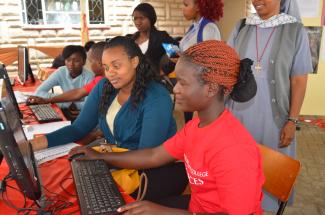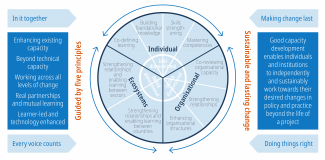Real and lasting capacity is only developed where work is demand-driven, Southern-led, and based on long term engagement and partnership
Capacity development
Sustainability is core to all that we do. We believe that good capacity development enables individuals and institutions to independently and sustainably work towards their desired changes in policy and practice, beyond the life of a project.
Understanding local context and building on existing capacities
Our approach to capacity development is founded on deep expertise and technical knowledge. But we also recognise that power and politics play a huge role in addressing processes of change within complex knowledge systems. Too often a lack of capacity is assumed. We start by recognising the capacity that already exists. Our approach is to identify how we augment and add value to this existing capacity, and ensure we understand the social and political context in which capacity is being strengthened.
Our Learning & Capacity Development framework
Effective capacity development requires that we work at multiple levels. We work with our partners to strengthen capacity at institutional and individual levels, and to be able to work more effectively with other organisations as part of a national knowledge ecosystem.
Our approach is guided by our Learning and Capacity Development Framework, which has three defining elements:
- A multidirectional and interrelated approach to change: We recognize that change is multifaceted and multi-layered. Our framework enables us to enter at any point of the learning journey, identify connections and relationships between dimensions and support the progression and layering of learning.
- Mutual learning: We are committed to genuine collaboration with Southern institutions. We start by understanding – with partners – the questions they wish to explore, the local context, needs and the existing capacity of the individuals, institutions, or the system. From here, we work together to define the problem and identify the most appropriate solutions for this context. We jointly deliver the project, and evaluate and communicate what we’ve mutually learnt and the difference we have made.
- Learner-led, technology-enhanced capacity development: Our approach to capacity development is founded on the theory and practice of effective adult learning, and supported by Digital Principles for Development that guide thoughtful and strategic use of technology to enable a coherent learning journey and bridge interventions at various levels. We use technology to reach new learners, to provide learning at scale, or to offer more flexible modes of support which respond to the reality of busy professional and personal lives. We use five key success ingredients: meeting people where they are; making the most of technology but recognizing constraints; enabling social interaction; facilitating reuse, customization and local ownership; and co-planning for sustainability.
Beyond training – putting capacity into practice
We use a wide range of capacity development choices, tailored to the needs of our partners and targeting different levels of change.
At the individual level we
- Develop the skills of key actors in the research and knowledge system, according to learning goals - for example, creating initial awareness about a subject, building basic 'starting knowledge' and skills, strengthening skills and deepening knowledge, or putting this into practice in the workplace.
- Design and deliver training, mentoring, and advisory support through face-to-face and online approaches.
At the organizational level we
- Strengthen relationships and shared learning within and across teams – for example through joint problem-solving workshops.
- Assist partners to identify the changes needed to structures and processes to ensure that capacity development initiatives can be sustained - for example, embedding training into an institution’s professional development programme.
- Assist partners to identify changes needed to organisational ways of working – for example assessing needs and developing tailored plans to increase the use of evidence in public institutions.
At the systems, or environmental, level we
- Work across national research and knowledge systems to convene and connect key actors, strengthening relationships and the exchange of knowledge.
- Connect Southern partners to peers regionally and internationally, for example via webinars, peer learning, or mentoring.


